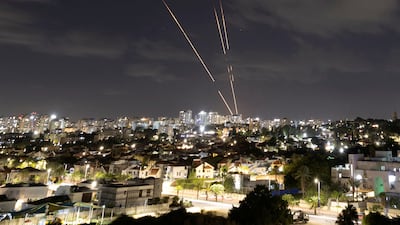This is a dangerous and unpredictable moment in the Middle East. The long-running conflict between Israel and Iran – hitherto fought largely through proxy forces and stealth operations – has moved into the open. On Monday night Israel began a ground invasion of Lebanon, and within 24 hours Iranian missiles rained on Israeli population centres as well as military installations in the Negev. More than at any other time in the past year, a multi-front, full-scale regional war appears possible.
Israel has vowed to carry out “powerful strikes” across the region in revenge, with Israeli Prime Minister Benjamin Netanyahu saying: “Iran made a big mistake tonight – and it will pay for it.”
The leaderships of Iran and Israel may think they are playing a highly calibrated game of brinksmanship. Indeed, some have interpreted the Iranian missile attacks as a face-saving exercise following Israel’s deadly strikes on Tehran’s allies – Hezbollah in Lebanon, and the Houthis in Yemen. But communicating by launching missiles and drones across neighbouring countries’ airspace has the potential not just to cost lives, but to spark an uncontrollable conflict.
The consequences of miscalculation are profound, and other countries in the region are right to be alarmed. A Jordanian government spokesman on Tuesday insisted that the kingdom – whose military took down several Iranian missiles in its airspace – must not become an “arena for conflict”.
Mistakes during hostilities can and do happen. In January 2020, two Iranian surface-to-air missiles brought down a civilian airliner shortly after it took off from Tehran’s Imam Khomeini International Airport amid tensions between Iranian and US forces following the assassination of Iranian commander Qassem Suleimani five days earlier. In July 1998, 290 people lost their lives when a US warship fired on Iran Air Flight 655 as it flew above the Arabian Gulf. Despite advancements in modern military technology, the dangers posed by air strikes and missile launches to non-combatants are obvious. On Tuesday, Eurocontrol – a pan-European air traffic control agency – announced the closure of Jordanian and Iraqi airspace, and the closure of a key crossing point into airspace controlled by Cyprus.
There may be back channels of communication via third parties that can mitigate this level of conflict or prevent a worst-case scenario. But that will be cold comfort to the millions of people across this region whose futures currently lie in the hands of a handful of political and military decision makers in Iran and Israel. That some of these leading figures have repeatedly broken international law in Gaza and Lebanon, fomented conflict across the region or shown scant interest in de-escalation should worry all those tired of living on their nerves in an increasingly volatile Middle East.
There are several diplomatic exits from this cycle of attack and retaliation. Many in the international community would be willing to help defuse these tensions, with a starting point being an immediate ceasefire in Gaza and Lebanon. But as long as communication between regional protagonists is conducted with military hardware, the chance of the wrong message being received is too great.




